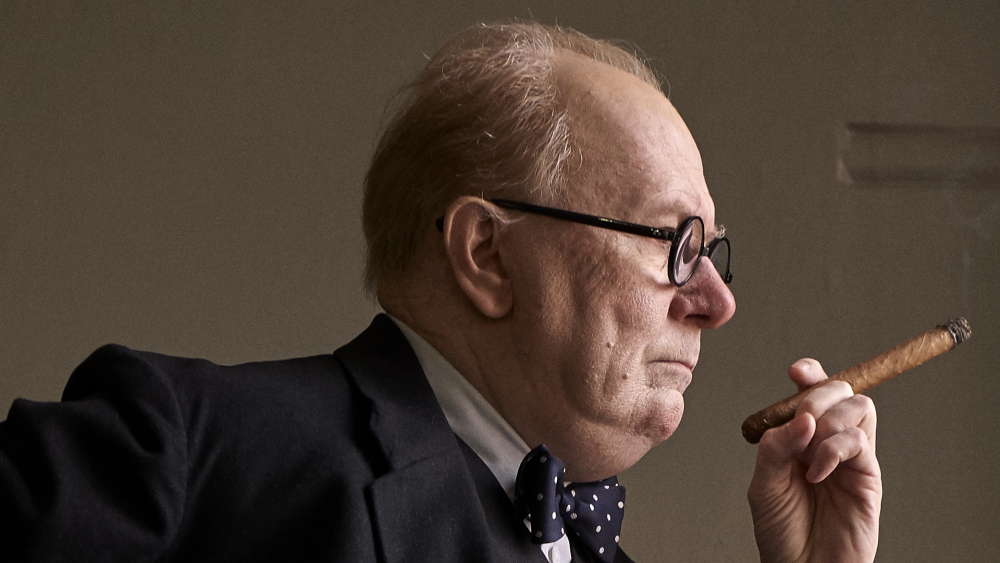By Liz Lopez
Rating: B+
Despite remarks made by others about multiple Winston Churchill or Dunkirk related films that have been released, this year director Christopher Nolan’s “Dunkirk” and Joe Wright’s “Darkest Hour” relates a part of history with a different story and each has value. I viewed the highly successful “Dunkirk” twice in the theaters earlier this year with the impressive script, performances and visuals, despite my incomplete knowledge of the history. This year’s Austin Film Festival (AFF) featured “Darkest Hour” from director Joe Wright, based on the screenplay by Anthony McCarten (“The Theory of Everything”). Although film fans may decide to not view another “war” film, “Darkest Hour” is so much more than that. Churchill stepped up to lead the British government as Prime Minister in the early 40s during wartime although he was not his party’s first choice, replacing Prime Minister Neville Chamberlain (Ronald Pickup). Not only does the film focus on the actions he took during his term, but the audience also learns more through scenes of his private life, showing us how human he was when he doubted himself and dealt with depression. This screenplay is elevated by Gary Oldman’s award worthy performance as Winston Churchill, transformed by excellent make up work by Kazuhiro Tsuji to where he is unrecognizable at the onset. If anyone thinks viewing past photos or recordings of the historical figure is enough, Oldman’s portrayal of Churchill should not be missed for all he brings to the role.
While “Dunkirk” features the soldiers on the ground, air and sea facing incredible odds, “Darkest Hour” provides details about the politics that take place when the new prime minister takes over at the time Hitler is in the midst of a takeover of Belgium and France. There is plenty of action in “Darkest Hour” in different locations that keeps the viewer engaged. Churchill always appears to be on the move, from the cabinet war rooms, to private talks with King George (Ben Mendelsohn), Westminster Palace, the House of Commons or a private room to talk to U.S. President Franklin D. Roosevelt where he learns of recent neutrality agreements. His persona is rough and tough, until we see Churchill in his own private residence. His wife Clementine (Kristin Scott Thomas) is the strength behind the man and keeps him going. Her performance is excellent as a wife who takes second place to her husband’s career, yet stays strong for him, her family and the nation in the few scenes she has throughout the film. She knows her husband’s abilities to build coalitions, as well as his convictions and willingness to defy Hitler and to declare war when most all others want peace.
Lily James portrays Elizabeth Layton, Churchill’s secretary in McCarten’s screenplay, the one of many who was able to withstand the demands from the boss for letters and speeches and keep up with him. There are shades of humor in this story as she manages to stay ahead, while also being supportive during the trying times of crisis. The addition of her character is a welcome one.
After viewing “Darkest Hour”, this story from the political perspective complements “Dunkirk” and made each one more complete for me to learn about British history. I highly recommend viewing “Darkest Hour” as it relays a significant time in history about the man who led his nation against many internal and external odds from being overrun by Hitler. It certainly can be a memorable film for many.
Additional cast among the many include: Stephen Dillane, Nicholas Jones, Samuel West, David Schofield, Richard Lumsden and Malcolm Storry.
Camera (color): Bruno Delbonnel. Editor: Valerio Bonelli. Music: Dario Marianelli.
(English, French dialogue)
MPAA Rating: PG 13 Running time: 2hours and 5 minutes.
Source: Focus Features
